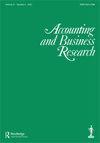为什么会计问题最终会被归为“太难”?实践者的观点
IF 1.4
4区 管理学
Q2 BUSINESS, FINANCE
引用次数: 0
摘要
很高兴有机会对Katherine Schipper的深思熟虑的论文(Schip/2022)做出回应。国际会计准则理事会一直与学术界密切合作,凯瑟琳的思想领袖地位一直备受赞赏。Katherine Schipper的论文涉及了一些最棘手的会计问题,这些问题多年来一直无法解决。她强调了负债和权益、业绩报告和其他综合收入之间的区别。这些确实是非常棘手的问题,在我担任主席期间,这些问题占用了我们董事会的大部分时间,而我们却无法拿出100%完美的解决方案。Katherine给出了这类会计问题仍然难以捉摸的两个主要原因。第一个根本原因是缺乏明确的概念解决方案。即使存在基于概念的解决方案,解决方案在实践中也可能不可行,例如,当它需要如此多的主观判断和估计,以至于产生的信息不太可能具有可比性时。也可能是这种解决方案导致财务绩效报告结果被认为是固有的不良结果。在这方面,Katherine特别提到了对损益表波动性的普遍敌意。本文章由计算机程序翻译,如有差异,请以英文原文为准。
‘Why do accounting issues end up in the “too difficult” box?’ A practitioner view
It is a pleasure to have the opportunity to react to Katherine Schipper ’ s thoughtful paper (Schip-per 2022). The IASB has always worked closely with academia and Katherine ’ s thought leader-ship has always been much appreciated. Katherine Schipper ’ s paper touches upon some of the most intractable accounting issues that have proven to be unsolvable over the years. She men-tions the distinction between liabilities and equity, performance reporting and other comprehen-sive income. These were indeed very tough issues which took up much of our Board time during my chairmanship without us being able to come up with a 100% perfect solution. Katherine gives two main reasons for such accounting issues remaining elusive. The fi rst underlying cause is the lack of clear conceptual solutions. Even when a conceptually grounded solution exists, a solution may not be feasible practically, for example when it requires so many subjective judgments and estimates that the resulting information is unlikely to be comparable. It can also be the case that the solution leads to fi nancial performance reporting outcomes that are viewed as inherently undesirable. In this respect Katherine refers speci fi cally to the widespread hostility to volatility in the income statement.
求助全文
通过发布文献求助,成功后即可免费获取论文全文。
去求助
来源期刊

Accounting and Business Research
BUSINESS, FINANCE-
CiteScore
3.40
自引率
11.80%
发文量
38
期刊介绍:
Accounting and Business Research publishes papers containing a substantial and original contribution to knowledge. Papers may cover any area of accounting, broadly defined and including corporate governance, auditing and taxation. However the focus must be accounting, rather than (corporate) finance or general management. Authors may take a theoretical or an empirical approach, using either quantitative or qualitative methods. They may aim to contribute to developing and understanding the role of accounting in business. Papers should be rigorous but also written in a way that makes them intelligible to a wide range of academics and, where appropriate, practitioners.
 求助内容:
求助内容: 应助结果提醒方式:
应助结果提醒方式:


